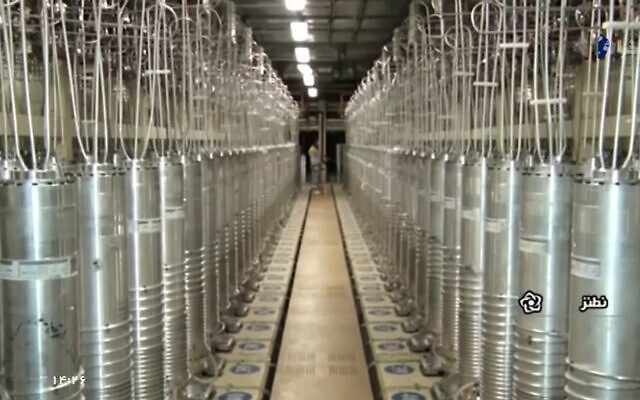Iran has reportedly informed European mediators that it is not ready to resume indirect talks with the US aimed at reviving its multilateral nuclear deal unless radical President Ibrahim Raisi takes office is.
“They are not ready to back down before the new government,” a diplomatic source told Reuters news agency on Wednesday, admitting it was not clear until August 5, when Raisi replaces the relatively moderate Hassan Rouhani. , or later when there is a new cabinet.
“We are no longer talking probably before mid-August,” the source clarified.
Iran and the US have been holding indirect talks in Vienna since April on a joint withdrawal in the Joint Comprehensive Plan of Action, which gave Tehran sanctions relief in exchange for significant sanctions on its nuclear program. Former President Donald Trump vacated the accord in 2018 and introduced severe sanctions against Iran, leading the Islamic Republic to engage in a series of breaches of the accord.
A sixth round of talks was postponed to late June, and while the Biden administration has expressed interest in returning to the negotiating table, its officials have voiced growing pessimism about the prospects of a deal.
The latest Iranian notice could deal a fatal blow to efforts to revive the JCPOA, as analysts have long speculated that a deal would be more likely to be struck during the ongoing lame-duck period between the US and Iran, while Rouhani is still in power and before. Inauguration of Raisi – a longtime proponent of his country’s nuclear program. It was Rouhani’s administration that negotiated a multilateral deal with former President Barack Obama in 2015.

President Hassan Rouhani speaks with the media after his meeting with elected President Ibrahim Raisi, the current judiciary chief, in Tehran, Iran June 19, 2021. (AP via the official website of the Office of the Iranian Presidency)
A US State Department spokesman confirmed on Wednesday that Iran had indeed sought more time before resuming talks in Vienna because of the president’s infection.
“We were prepared to continue negotiations, but the Iranians requested more time to deal with their presidential change,” the spokesman said.
“When Iran completes its process, we are ready to make plans to return to Vienna to continue our talks,” he said. “We are interested in seeking a reciprocal refund for compliance with the JCPOA, however: [Secretary of State Antony Blinken] Have made it clear, this proposal will not be on the table indefinitely,” the spokesperson said.
Earlier on Wednesday, however, White House Press Secretary Jen Psaki said a recent attempt by Tehran to kidnap an Iranian-American journalist had been thwarted by US attempts to re-enter the JCPOA. will not affect
While Saki explicitly condemned the kidnapping, he told reporters during the daily press briefing, “We still see it in our national interests to engage in ongoing discussions about Iran’s path to obtaining nuclear weapons.” for greater visibility.”
Also on Wednesday Rouhani said he hoped Raisi’s administration in Vienna “will be able to finish the job”.

In this image created from April 17, 2021, video released by Islamic Republic of Iran Broadcasting, IRIB, state-run TV, various centrifuge machines line a hall at Iran’s Natanj uranium enrichment facility. (IRIB via AP)
“There is no difference between whether the current or the next administration will succeed, but we are very sorry that almost six months of opportunity has been lost,” he said.
The outgoing president also warned if his country could enrich uranium to a weapons-grade level of 90 percent, though he still wanted to salvage his broken nuclear deal with world powers.
But the comments by state-run IRNA news agency came as they also criticized Iran’s broader theocracy for not allowing its government to reach an agreement soon enough to restore the 2015 nuclear deal.
Rouhani’s powers have been eroded as the public sours on his government amid an economy battered by US sanctions. But his comments indicate Iran may take a more belligerent stance with the West as hardline President Ibrahim Raisi takes office next month.
The 2015 nuclear deal, which granted Iran relief from those crushing sanctions, narrowed Tehran’s program to just 3.67%—enough to power a civilian nuclear reactor. It now enriches a small amount of uranium by up to 60%, which is a small step up from weapons-grade levels.
Rouhani also complained that hardliners outside his relatively liberal government had blocked his efforts to reach an agreement in Vienna. For months, negotiators have been trying to find a way for Iran to return to the extent of the deal and for the US to rejoin the deal from which then-President Donald Trump unilaterally withdrew.
AP contributed to this report